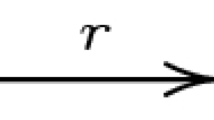Abstract
I argue that if we make explicit the role of the user of scientific representations not only in the application but also in the construction of a model or representation, then inconsistent modeling assumptions do not pose an insurmountable obstacle to our representational practices.
Similar content being viewed by others
Notes
References
Bartels, A. (2006). Defending the structural concept of representation. Theoria, 55, 7–19.
Belot, G. (2007). Is classical electrodynamics an inconsistent theory? Canadian Journal of Philosophy, 37(2), 263–282.
Frisch, M. (1998). Theories, models, and explanation. Thesis (Ph.D. in Philosophy, University of California, Berkeley, 1998).
Frisch, M. (2004). Inconsistency in classical electrodynamics. Philosophy of Science, 71(4), 525–549. doi:10.1086/423627.
Frisch, M. (2005). Inconsistency, asymmetry, and non-locality: A philosophical investigation of classical electrodynamics. Oxford: Oxford University Press.
Frisch, M. (2008). Conceptual problems in classical electrodynamics. Philosophy of Science, 75(1), 93–105.
Frisch, M. (2009). Philosophical issues in electromagnetism. Philosophy Compass, 4(1), 255–270.
Giere, R. N. (2006). Scientific perspectivism. Chicago: University of Chicago Press.
Goodman, N. (1976). Languages of art: An approach to a theory of symbols (2nd ed.). Indianapolis: Hackett.
Muller, F. A. (2007). Inconsistency in classical electrodynamics? Philosophy of Science, 74(2), 253–277. doi:10.1086/520942.
Steinhagen, R. J. (2007). LHC beam stability and feedback control. CERN-AB- 2007–049 BI. http://cdsweb.cern.ch/record/1054826/files/ab-2007-049.pdf.
Suárez, M. (2004). An inferential conception of scientific representation. Philosophy of Science, 71(5), 767–779. doi:10.1086/421415.
Suárez, M. (2010). Scientific representation. Philosophy Compass, 5(1), 91–101. doi:10.1111/j.1747-9991.2009.00261.x.
Teller, P. (2001). Twilight of the perfect model model. Erkenntnis, 55(3), 393–415.
Teller, P. (2004). How we dapple the world. Philosophy of Science, 71(4), 425–447. doi:10.1086/423625.
Vaihinger, H. (1922). Die Philosophie des Als Ob. Leipzig: Felix Meiner.
Van Fraassen, B. C. (2008). Scientific representation: Paradoxes of perspective. Oxford: Clarendon Press.
Vickers, P. (2008). Frisch, Muller, and Belot on an inconsistency in classical electrodynamics. British Journal for the Philosophy of Science, 59(4), 767–792.
Wilson, M. (2008). Wandering significance: An essay on conceptual behaviour. New York: Oxford University Press.
Woodward, J. (2003). Making things happen: A theory of causal explanation. New York: Oxford University Press.
Acknowledgments
Research for this paper was conducted partly while I had a fellowship for experienced researchers by the Alexander-von-Humboldt Foundation at the Ludwig-Maximilians-Universität in Munich. I would like to thank C. Ulises Moulines and Wolfgang Pietsch for helpful discussions. I also want to thank Paul Teller and Peter Vickers for detailed comments on drafts of this paper.
Author information
Authors and Affiliations
Corresponding author
Rights and permissions
About this article
Cite this article
Frisch, M. Models and scientific representations or: who is afraid of inconsistency?. Synthese 191, 3027–3040 (2014). https://doi.org/10.1007/s11229-014-0471-9
Received:
Accepted:
Published:
Issue Date:
DOI: https://doi.org/10.1007/s11229-014-0471-9




